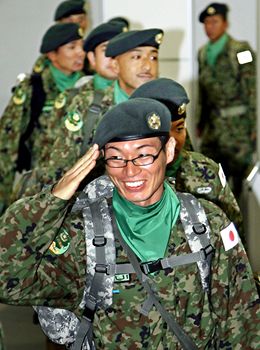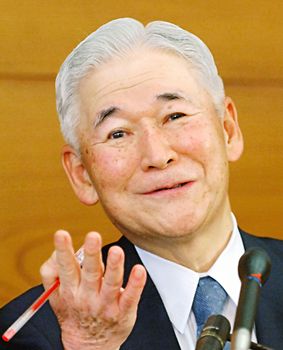
Now that the troops are home, Japan’s government (and its good buddies in the Japanese media) can’t stop patting itself on the back for “completing its humanitarian mission” building schools and so on in Samawah even as the rest of Iraq succumbs to civil strife. From the initial announcement on June 20:
The Government of Japan decided today that it will redeploy the Ground Self-defense Force (GSDF) troops in Samawah, Iraq. This decision is based on the judgment that the humanitarian and reconstruction assistance activities in Iraq being conducted by the GSDF in Samawah have fulfilled a certain role. The Government of Japan has also taken into consideration the establishment of the new Iraqi Government by the Iraqi people themselves and the ongoing process of transferring security responsibility in Al-Muthanna Province, where the GSDF troops have been operating, to the new Iraqi Government, and close consultations with the United States (US) as well as the Multi-National Forces (MNF) and other nations including the United Kingdom (UK) and Australia.
President Bush apparently agrees with this sentiment during Koizumi’s June 29 US visit:
We — as I mentioned, we discussed Iraq and Afghanistan. By the way, the Japanese defense forces did a really good job when they were in Iraq. And they’re able to leave because they did such a good job. And now the Iraqis will be running the province in which the Japanese forces used to be. Nevertheless, the Prime Minister, as he mentioned in the comments, will continue to provide airlift capacity and naval help.
Japan’s top newspaper, the Daily Yomiuri, gushes over the SDF’s apparent accomplishments:
As Prime Minister Junichiro Koizumi put it, “There were no pistols fired, and no guns pointed at anybody,” and there were no fatalities among the GSDF personnel.
The work carried out by about 5,500 GSDF members has been given high marks by the Iraqi government, and their mission was a success.
According to a Yomiuri Shimbun poll conducted earlier this month, 68 percent of pollees said the activities by members of the Self-Defense Forces “contributed” to the reconstruction of Iraq, compared with 28 percent who said they “made no contribution.” Gradually, the public are backing the activities of the SDF.
This is frankly pathetic. Let’s remind ourselves of what it’s like in Iraq right now:
In the first half of this year, 4,338 Iraqi civilians died violent deaths, according to a new report by the U.N. Assistance Mission for Iraq. Last month alone, 3,149 civilians were killed — an average of more than 100 a day.
Some would say “What could Japan realistically do, given its pacifist constitution and the limited mandate provided by the special law that allowed them to be there in the first place?” Well, yeah. But in that case what were they doing there in the first place? And what right do they have to give themselves credit for cursory jobs that could have easily been covered by Americans?
The Nikkei at least admits the self-centered political calculations behind the deployment and doesn’t attempt to trumpet non-existent accomplishments:
EDITORIAL: GSDF Iraq Mission Ends With Constitutional Issue Unresolved
TOKYO (Nikkei)–Japan’s Ground Self-Defense Force on Monday finished withdrawing its troops from Iraq after two and a half years of humanitarian activities there in a mission that marked a significant milestone in the postwar history of the nation’s defense policy.
Almost miraculously, GSDF troops suffered no casualties during the dangerous mission, which signaled Japan’s desire to play a greater role in the international arena and raised some important legal questions.
The GSDF’s operations in Iraq, which started in January 2004, were based on a special law to support the country’s reconstruction that came into effect in August 2003.
The government carefully planned and prepared for the operations to ensure that GSDF troops would not get embroiled in any armed battles. It selected the southern Iraqi city of Samawah as the site for the GSDF activities, rather than northern areas where U.S. troops are stationed, mainly for safety reasons. It was apparently the right decision.
I’ll agree with the editorials on the obvious point that Japan has crossed a certain line on its way to normalizing its military. But don’t let that delude you into thinking that somehow equates some actual accomplishments in Iraq, especially since it’s becoming clearer than ever that Iraq is on its way down the toilet.


